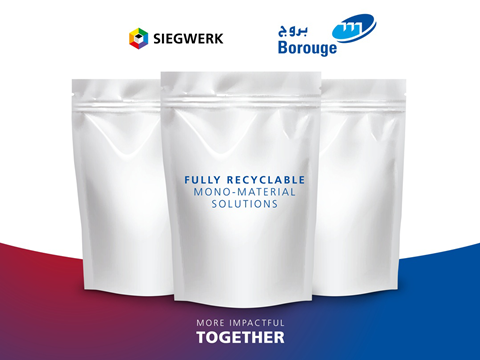
Siegwerk is working with Borouge to develop a ‘pipeline’ of fully recyclable, mono-material packaging solutions, including multi-material packs with advanced mono-material structures, in a bid to meet converters’ increasing demand for sustainable options on the market.
Siegwerk intends to combine its knowledge of printing inks and coatings for packaging and labels with Borouge’s range of polyolefin solutions; both companies’ products have been designed with recyclability in mind. By coming together, the companies hope to phase out hard-to-recycle multi-material packaging structures, reduce carbon emissions, and demonstrate the value of collaboration across the supply chain in pursuit of a circular economy.
“The majority of flexible packaging still consists of mixed materials and because of this multi-material structure, it is challenging to recycle it in the conventional recycling streams,” explains Dr. Stephane Bertaux, head of Brand Owner Collaboration and Circular Economy for Southeast Asia at Siegwerk Thailand. “Here, the switch to mono-material packaging is an essential lever to ease the recycling of packaging and thus enhance its circularity.”
Even so, Siegwerk explains that there are obstacles to overcome when transitioning into mono-materials. These can include sealability, particular mechanical properties, thermal stability, and specific levels of barrier performance depending on the end-use application.
“Enabling mono-material structures using Borouge’s performance polyethylene products with the combination of innovative ink and coating technologies can achieve the desired packaging outcomes,” continues Anton Wolfsberger, vice president, Global Marketing, Packaging and Circular Economy, Borouge Pte Ltd. “With this new way of industry collaboration, we contribute to addressing global challenges to increase sustainability and circularity.
“Upcycling is becoming possible through mechanical recycling, resulting in high quality recyclates to further boost circularity and lower carbon footprint versus currently used multi-material packaging, which are mostly incinerated.”
As one of its first projects, the partners will produce a barrier stand-up pouch using HDPE FB5600 – based on Borealis Borstar technology – from Borouge and Siegwerk’s oxygen barrier coating CIRKIT OxyBar BC1582. It will also utilize its primer solution, CIRKIT Clearprime, to enable smooth laminate deinking.
“By incorporating our special deinking and delamination primer into this innovative mono-material structure with superior performance and mechanical properties, all used inks and coatings can be removed of the printed film during the recycling process resulting in high-quality recycled polyethylene that is suitable for re-use in new packaging materials,” Bertaux adds.
Siegwerk and Borouge are already working with selected converters to develop barrier coatings with optimal oxygen and moisture vapour transmission rates – aspiring for a figure of < 1cc/m2.day in both cases.
Borouge also collaborated with Borealis back in 2019 to unveil a range of pouch solutions based on polyethylene and polypropylene. This included two PP pouch concepts, including a Full PP Laminate with high barrier properties; a Full PE Laminate said to offer excellent machinability and a broad sealing range; and a fully recyclable Full PE Laminate containing recycled content.
In a previous installment of the Packaging Europe Podcast, our editor at large, Elisabeth Skoda, spoke to Siegwerk’s global head of Sustainability and Circular Economy, Alina Marm, about the journey of printing inks and coatings across their life cycle – focusing on the company’s UniNATURE range, which partially replaces fossil carbon with biorenewable carbon.
Marm also talked us through Siegwerk’s work with Henkel to develop a printable oxygen barrier coating for mono-material plastic films; this was nominated for a Sustainability Award in 2023 under the pre-commercialized Recyclable Packaging category.
Meanwhile, DTM Print previously unveiled a new range of mono-material label materials, biobased papers, and a colour label printer – aiming to enhance label production by boosting recyclability, increasing efficiency, and lowering environmental impact.
If you liked this story, you might also enjoy:
Report: The ultimate guide to global plastic sustainability regulation
The Brief: Oxo-(bio)degradables: the who, what, and why of breaking down fossil-based plastics
Sustainable Packaging Summit: How Kraft-Heinz uses collaboration to drive innovation
The Brief: Using ocean-bound plastic in packaging – how, why and should we?














No comments yet